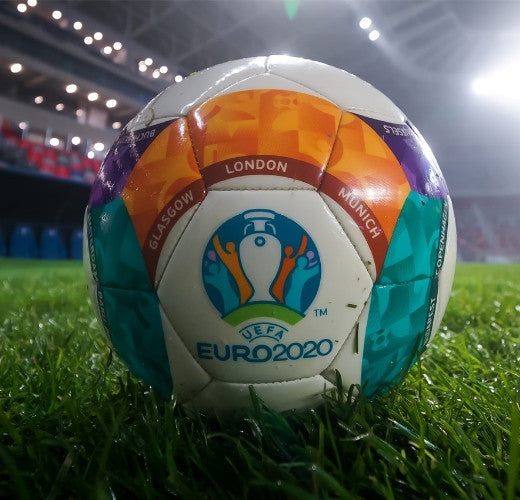Euro Cup 2020 – Some Changes
Among other things that the pandemic took from us, 2020 was a calendar year largely bereft of large sporting events – or, if they did take place, they were drastically different than what we had become used to. So it comes as a (welcome) shock to all of us that Euro Cup 2020 will be kicking off, no pun intended, in early June, with some rather big changes to the standard procedure.
The Euro Cup, more formally known as the EFA European Championship, was supposed to take place this time last year, and will instead unfold as a kind of unprecedented, multi-location global event that will take place in assorted locations across Europe. This means no teams are qualified by default, making competition for a slot in the finals even fiercer than it might have been before. Euro Cup 2020 will also mark a sixty-one year anniversary for the tournament, and will feature twenty different teams playing at twelve different venues in twelve internationally recognized cities. In short: this year’s Euro Cup will feature over twenty-four teams (six groups made up of four overall teams, really), which is partially a result of the union deciding to allow more teams into the competition after a 2016 decree.
A note: we’ll be hyper-linking the names of various Euro Cup teams, like so, to their items on our online store, should you want to get some home-team shopping done before the competition begins in earnest.
Multiple Locations
It was not an easy or simple decision to completely alter the traditional way that the Euro Cup had unfolded in a pre-pandemic world. However, in conjunction with the upcoming 60th anniversary of the event itself, it ended up being an instance of rather beneficial and fortuitous circumstance. FIFA President Gianni Infantino has expressed a desire to throw a “party” across Europe with Euro Cup 2020, one that enlivens the summer of 2021 with all the joy and infectious love for sport that soccer fans were denied last year, when the world as we knew it changed so abruptly.
As with any sudden and unexpected changes to the ordinary way of doing things, fans can expect some hiccups in the protocol when it comes to this year’s Euro Cup – however, there is something reassuring in knowing that Infantino and the rest of the professionals in charge at the Union of European Football Associations (UEFA) are working tirelessly to make this a soccer-lover’s summer that will be remembered for years to come.
| Games | Country | City | Stadium |
|---|---|---|---|
| Group stage & Round of 16 | Denmark | Copenhagen | Parken Stadium |
| Group stage & Round of 16 | Hungary | Budapest | Frenc Puskas Stadium |
| Group stage & Round of 16 | Ireland | Dublin | Aviva Stadium |
| Group stage & Round of 16 | Netherlands | Amsterdam | Johann Cluijff Areana |
| Group stage & Round of 16 | Romania | Bucharest | Arena Nationala |
| Group stage & Round of 16 | Scotland | Glasgow | Hampden Park |
| Group stage & Round of 16 | Spain | Bilbao | San Mames Stadium |
| Group stage & Quarter-final | Azerbaijan | Baku | National Stadium |
| Group stage & Quarter-final | Germany | Munich | Allianz Arena |
| Group stage & Quarter-final | Italy | Rome | Stadio Olimpico |
| Group stage & Quarter-final | Russia | Saint Petersburg | Krestovsky Stadium |
| Group stage, Round of 16, Semi-finals & Final | England | London | Wembley Stadium |
Who’s Playing?
This year’s game features players from across the world, including star teams and players Copenhagen, Glasgow, Munich, Rome, and more, and playing in arenas ranging from San Mames Stadium in Spain to London’s famed Wembley Stadium. All teams will engage in at least three-group stage game, with one knock out round tie per team. Big names like former Bayern Munich player Thomas Müller will be seen competing on behalf of Germany, and word is he’ll be switching his current jersey number 13 to his old number when he played for Bayern Munich, 25. Expect to see the likes of Portugal and Holland vying for the top spot as well.
The 20 teams that qualified via the groups have been joined by the four play-off winners.
- Group A: Turkey, Italy, Wales, Switzerland
- Group B: Denmark, Finland, Belgium, Russia
- Group C: Netherlands, Ukraine, Austria, North Macedonia
- Group D: England, Croatia, Scotland, Czech Republic
- Group E: Spain, Sweden, Poland, Slovakia
- Group F: Hungary, Portugal, France, Germany
The qualifiers for the Euros that are to be held later this year initially took place from March to November of 2019. Among the twenty teams that were automatically approved for game play: Croatia, Denmark, England, Finland, Turkey, Wales, Poland, Russia, and more. A round of play-offs will decide the victors who move on to the next level of play, and nearly each league produces at least one team that qualifies for the Cup (the playoff rounds, in the case that a winner has already been announced, will then go to the team with the next best ranking). France will most definitely be in the mix after dominating Russia in the 2018 world cup, and all eyes are also on teams like Belgium, Italy, and Spain, for whom sports analysts and Cup fanatics are predicting big things (recently, controversial headlines were made when Real Madrid captain Sergio Ramos, who has endured any number of recent injuries, was left off of Spain’s Euro Cup 2020 squad).
The UEFA and their associates are currently working on refunding the tickets purchased by those over a year ago, before the COVID-19 pandemic prompted unforeseen delays. For more info on tickets, please visit the following link.
Euro Cup Final 2020 / Kick Off
Of all the stadiums and venues we’ve quoted in this article, Wembley Stadium in London is one that undoubtedly holds a rather sentimental spot in the hearts of soccer fans. It’s been the site of some crushing losses, some rousing victories, and is generally an iconic and beloved spot for United Kingdom footballers, and those who love to see the game played live. So it makes sense, then, that this year’s Euro Cup final will be held at that renowned hall of athletic excellence, affectionately nicknamed “The Hall of Football,” where fans will no doubt flock in mass droves for two sure-to-be-exciting semi-final matches.
Wembley has also undergone something of an architectural facelift in the last decade and a half: it now boasts a seating capacity of around 90,000 individuals, and has since hosted League Cup finals as well as the FA Cup. Not too shabby!
As of writing this, the tournament is still slated to take place in June of this year. That said, with cases fluctuating across the globe – in spite of the fact that overall severity of cases is down in countries like the United States, where vaccination distribution has largely succeeded – there is still a small chance that external factors might influence the outcome of the Cup.
Obviously, the decision to postpone the Euro Cup by a full year was one made in good faith and with the best of intentions; it has yet to be seen how exactly the transition will effect schedules for things like La Liga and the Premiere League, but as with anything that was delayed due to the COVID-19 pandemic, best to keep your mind open and prepare for anything.
So, having said all that, let us all toast to sixty years of athletic excellence and first-class soccer playing. Feel free to check out our selection of Euro Cup gear on the site, and we’ll see you all at Euro Cup 2020!
Share on:






























